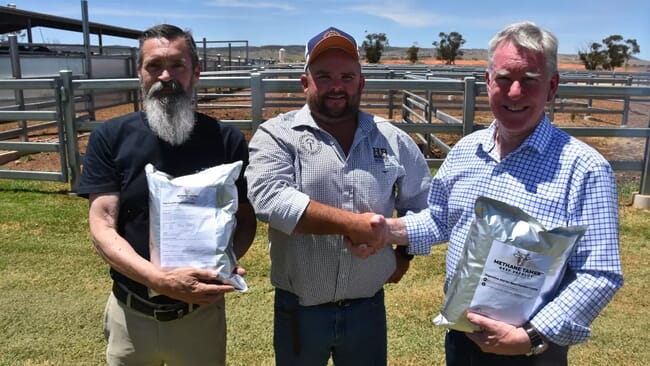
From left to right: Steve Meller, chief executive officer at CH4 Global; Heath Tiller, owner of the HB Rural feedlot; and Reg Smyth, chief executive officer at CirPro Australia, a cattle processing company © Alisha Fogden
The commencement of commercial deliveries of CH4 Global's seaweed-based supplement marks a key step toward the company’s ambitious goal of reducing CO2-equivalent emissions by one billion metric tonnes by the end of this decade, according to a press release from the company.
The delivery of the first commercial quantities of the supplement came as CH4 Global started construction of what will be the world’s first commercial-scale facility for growing Asparagopsis seaweed - the main component of the methane-reducing supplement, called Methane Tamer. Scheduled to begin operations in the fourth quarter of this year, the so-called “EcoPark” will cultivate the red seaweed in large-scale saltwater ponds and then formulate it into Methane Tamer. The facility in Louth Bay, South Australia, which CH4 Global sees as the first of many EcoParks it will eventually build around the world, will produce enough Asparagopsis to supply up to 30,000 cattle per day.
“2024 marks a pivotal year, one when the world wakes up to seaweed’s massive potential for curbing enteric methane emissions and we as a company aggressively scale up our efforts to combat climate change,” said CH4 Global chief executive officer Steve Meller, who personally delivered the first shipment of Methane Tamer.
“The first commercial delivery of Methane Tamer and the commencement of our EcoPark construction are concrete milestones in our quest to achieve one billion metric tonnes of reduction in CO2-equivalent emissions by 2030,” he added.
CH4 Global’s Methane Tamer is specifically formulated to ensure consistent, stable levels of methane-reducing compounds, and to make it easy for farmers to incorporate it in cattle feed.
“Our ongoing investment in research and development for efficient, reliable growth of Asparagopsis plus refinements of our proprietary processing techniques allows us to deliver the highest-quality value product with costs low enough for farmers to have a positive return on their investment,” Meller said.
The latest CH4 Global milestones come as global leaders step up efforts to curb methane emissions. A powerful greenhouse gas that cows naturally produce, methane is over 80 times more potent than CO2 in trapping heat in the atmosphere over a 20-year period, making it a critical target of efforts to combat global warming. Agriculture is the largest human-made source of methane emission, with cows being the largest source of methane within agriculture.




